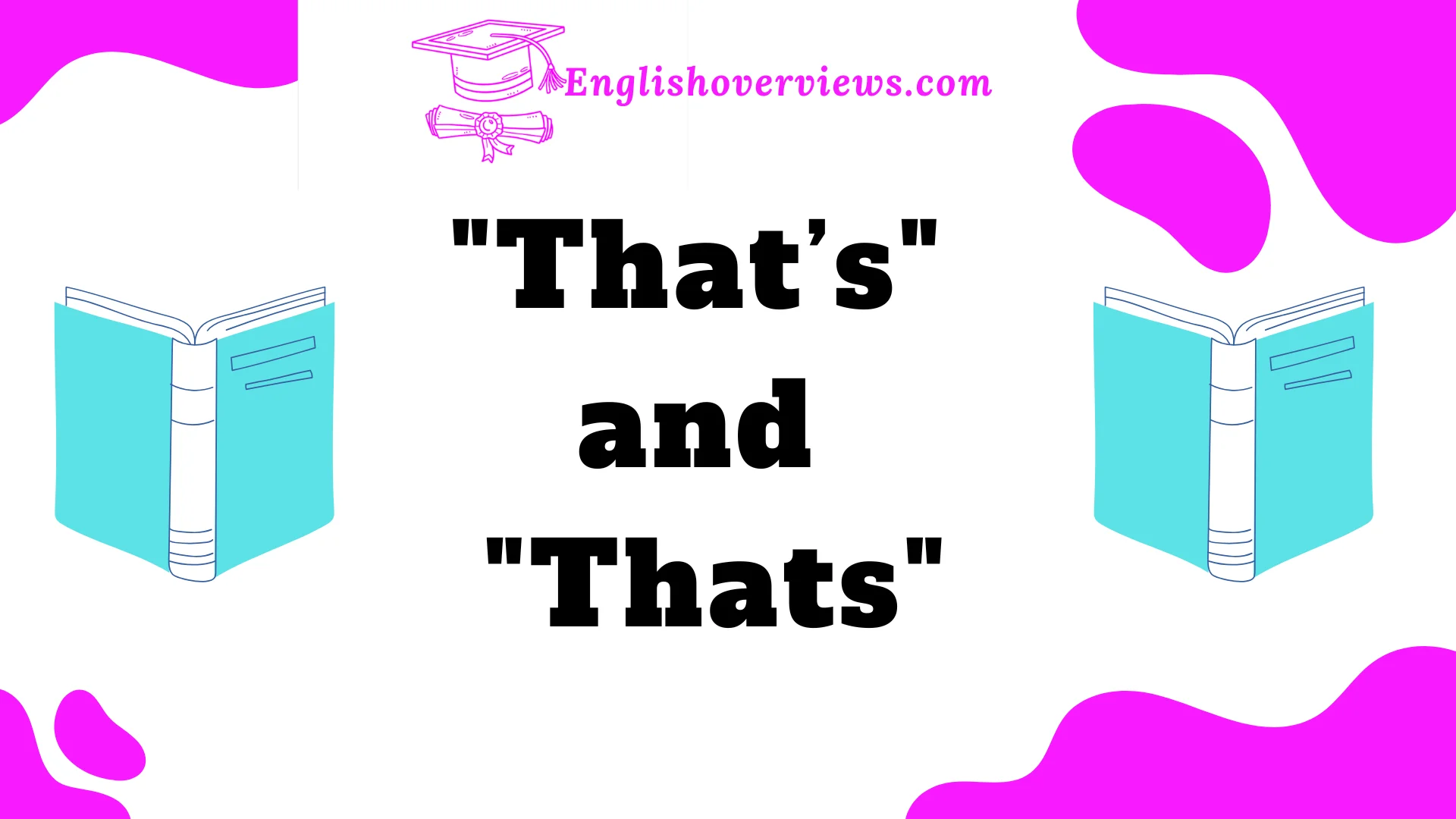Understanding the difference between “that’s” and “thats” is crucial for clear and professional communication. These two terms may seem similar at first glance, but their correct usage can make a significant impact on your writing—whether it’s for casual conversations, academic papers, or professional documents.
The confusion often arises due to the subtle nature of grammar rules in English, but don’t worry; this guide will break everything down for you in a simple, conversational style.
By the end of this blog, you’ll understand how to use “that’s” properly, why “thats” is often incorrect, and the rare cases where “thats” might actually be right.
Let’s dive in and tackle this topic with real-world examples, useful tips, and even a few exceptions to the rule. Get ready to never second-guess your choice again
Understanding “That’s” vs. “Thats”
What Is “That’s”?
“That’s” is a contraction, combining the words “that is” or **“that has.” It’s commonly used in both spoken and written English to make communication more natural and conversational. Here’s how it works:
- When “That’s” Means “That Is”:
- Example: “That’s a great idea!” (Expanded: That is a great idea!)
- When “That’s” Means “That Has”:
- Example: “That’s been resolved already.” (Expanded: That has been resolved already.)
Common Examples of “That’s” in Sentences
| Sentence | Expanded Form | Context |
| That’s the plan. | That is the plan. | Casual conversation. |
| That’s gone missing. | That has gone missing. | Describing an event. |
| That’s what I meant. | That is what I meant. | Explaining something to someone. |
Using “That’s” correctly ensures that your writing sounds professional and clear without unnecessary complexity.
What Is “Thats”?
The term “Thats” is typically a mistake in English. It lacks an apostrophe and does not follow grammatical rules for contractions. Here’s why it’s incorrect:
- Missing Apostrophe: The absence of the apostrophe makes “thats” grammatically invalid in standard English.
- Misuse in Writing: Many people type “thats” out of habit or speed, especially in informal settings like texting.
Incorrect Example:
- “Thats the way it should be.” (Correct: “That’s the way it should be.”)
The Versatility of “That’s”
1. “That’s” as “That Is”
This is the most common usage of “That’s.” It acts as a contraction for “that is,” making your sentences shorter and more conversational.
- Example 1: “That’s wonderful!” (Expanded: That is wonderful!)
- Example 2: “That’s the problem we need to solve.” (Expanded: That is the problem we need to solve.)
2. “That’s” as “That Has”
When “That’s” represents “That has,” it’s often used in the context of completed actions or past events.
- Example 1: “That’s been an incredible journey.” (Expanded: That has been an incredible journey.)
- Example 2: “That’s already taken care of.” (Expanded: That has already been taken care of.)
Why “Thats” Is Often Incorrect
Using “thats” instead of “that’s” can lead to confusion or misunderstandings. Here are the most common reasons for the error:
- Typing Errors:
- People often skip the apostrophe when typing quickly, especially on mobile devices.
- Lack of Awareness:
- Some may not realize that “thats” is grammatically incorrect.
- Overuse of Informal Writing:
- Informal communication on social media or messaging apps often ignores proper grammar.
Pro Tip: Always proofread your writing to spot and correct such mistakes before sharing it.
When “Thats” Isn’t Wrong
While “thats” is usually incorrect, there are exceptions where it’s perfectly valid:
1. Honda That’s: A Special Case
The Honda That’s is a Japanese microcar model. Here, “Thats” is part of the brand name and is not subject to standard grammar rules.
- Example: “I saw a Honda That’s on the road yesterday.”
2. Proper Nouns
In creative contexts, such as titles or brand names, grammatical conventions may not apply. For example:
- Book Title: “Thats the Spirit!”
Practical Tips for Using “That’s” Correctly
1. Use Memory Tricks
- Think of the apostrophe as a placeholder for the missing letter(s).
- Example: “That’s” = “That is” or “That has.”
2. Proofread Your Work
- Always double-check for missing apostrophes, especially in professional or academic writing.
3. Use Grammar Tools
- Tools like Grammarly or ProWritingAid can help spot and fix errors.
4. Practice with Examples
Fill in the blanks:
- “_______ the way we do it here.” (Answer: That’s)
- “_______ already been discussed.” (Answer: That’s)
FAQs About “That’s” vs. “Thats”
1. What does “That’s” mean?
“That’s” is a contraction of “that is” or “that has,” used to make sentences more concise and conversational.
2. Is “Thats” ever correct?
“Thats” is only correct when used as part of a proper noun, such as the Honda That’s car model.
3. How can I avoid using “Thats” by mistake?
Proofread your writing and use grammar-checking tools to spot errors.
4. Why is grammar important in communication?
Proper grammar ensures clarity, professionalism, and credibility in your writing.
5. What are some examples of “That’s” in sentences?
Examples include:
- “That’s incredible!”
- “That’s been a wonderful experience.”
Conclusion
Mastering the difference between “That’s” and “Thats” is a simple yet impactful way to improve your writing. By using “That’s” correctly, you’ll enhance your communication skills, avoid misunderstandings, and present yourself as a polished writer.
Remember the tips shared here, and don’t hesitate to rely on tools and resources to refine your grammar. Get it right, and let your words shine!

Alyan Ashraf is the creative mind behind English Overviews, a platform dedicated to helping learners master the English language. Passionate about education and language development, Alyan specializes in simplifying complex English concepts, making learning accessible for students of all levels.











